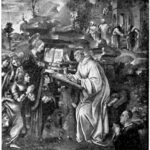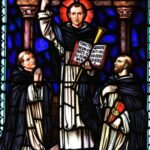St. Louis King of France
St. Louis King of France
When they lived: St. Louis IX, also known as St. Louis King of France, lived from April 25, 1214, to August 25, 1270.
Where they lived: St. Louis IX ruled from the magnificent city of Paris, the heart of France during the medieval period.
Notable world events during the time of their life:
- The Seventh Crusade (1248-1254): During this event, King Louis IX embarked on a daring and passionate mission to reclaim the Holy Land. His leadership and valiant efforts earned him respect from both allies and adversaries, leaving a lasting impact on European history.
- The Mongol Empire and the Battle of Ain Jalut (1260): Far beyond the borders of Europe, the Mongol Empire was rapidly expanding its dominion. In 1260, the Battle of Ain Jalut marked a significant turning point as the Mamluks of Egypt halted the Mongol advance. This event reshaped the dynamics of power in the Middle East and influenced international politics.
- The Great Famine (1315-1317): Although this occurred after King Louis IX’s life, it had its roots during his time. A series of crop failures and harsh weather conditions led to widespread famine across Europe. The consequences were devastating, affecting millions of lives and leaving a lasting impact on agriculture and trade in the region.
- The University of Oxford’s Establishment (c. 1248): While King Louis IX was still alive, one of the world’s oldest and most prestigious universities, the University of Oxford, was founded in England. This institution would go on to become a center of academic excellence and contribute significantly to advancements in various fields.
- Marco Polo’s Travels (1271-1295): Around the time of St. Louis IX’s death, the legendary explorer Marco Polo embarked on his epic journey to the Far East. His travels brought back incredible tales of the riches and wonders of the Orient, sparking curiosity and opening up new avenues of trade and cultural exchange between Europe and Asia.
Their patronage: St. Louis IX is often venerated as the patron saint of the Third Order of St. Francis. He was a devoted supporter of the Franciscan order and embodied their principles of humility, compassion, and service to the poor. Additionally, he is recognized as the patron saint of builders, as he was responsible for several ambitious construction projects during his reign, including the Sainte-Chapelle in Paris, a stunning Gothic chapel renowned for its breathtaking stained glass.
His Life as a King
When she was the regent ruler, Louis’ mother dealt with rebellious vassals and obtained a definitive victory in the Albigensian Crusade, which had started 20 years earlier. When Louis finally took over there, he also faced recurring conflicts with some of his kingdom’s most powerful nobles.
In spite of all the opposition, Louis annexed several provinces, notably parts of Aquitaine, Maine, and Provence. During the time he was in power, the kingdom of France reached an economic as well as political peak. He was highly regarded by his fellow European rulers.
St. Louis was also a reformer who developed the French royal justice system, where the king was the supreme judge. He banned the trial by ordeal, in which the accused were subjected to painful torture as a way of determining their innocence. He also introduced the principle of innocence until proven guilty.
St. Louis banned all forms of lending with the idea of getting an interest rate. He was renowned for his charity as he fed beggars from his table, washed their feet, and ministered to the needs of the lepers, who were generally ostracized.
As king, he would feed over one hundred people and eat their leftovers. He founded many hospitals and houses, such as the house of the Filles-Dieu for reformed prostitutes and the Quinze, Vingt, for 300 blind men.
At one point, Louis led the seventh crusade in his mid-thirties and the eighth crusade in his mid-fifties against the Ayyubids, Bahriyya Mamluks, and Hafsid Kingdom as a way of honoring a vow he had made in prayer when he was ill. When he was leading the seventh crusade, he was captured and ransomed against a third of France’s annual revenue, and he died from dysentery when he was leading the eighth crusade.
Up until the time his mother died in 1252, she remained a valued advisor to him. She advised him on how to be a great leader and a great Christian.
During the golden century of St. Louis, the kingdom of France was at its height both politically and economically. He commanded the largest army and ruled the largest and wealthiest kingdom, as well as the European center of arts and intellectual thought at the time.
St. Louis was also very famous for the style of his court because of artwork purchased from Persian masters. The Saint’s personal chapel, the Sainte Chapelle in Paris, was known for its intricate stained glass windows, and it has been copied more than once by his disciples everywhere.
His Life as a Christian
He is generally regarded as an ideal Christian ruler. St. Louis was inspired by Christian zeal and Catholic devotion. He is known for enforcing strict Catholic orthodoxy, and he punished those who blasphemed.
Saint Louis was also known for protecting the poor and never speaking ill of anyone. Everything that he did was for the glory of God and the good of his people. He excelled in penance, had a great love for the church, and was even merciful to the rebels.
Many Europeans had much respect for St. Louis, and it was mainly because of his personality and not because of his military dominance. He was the ideal example of a Christian prince. He had a reputation for fairness and saintliness, and in many cases, he was chosen as an arbiter of quarrels among rulers of Europe.
Another act to show his dedication to Christianity was when he burned 12,000 manuscript copies of the Talmud and other imported Jewish books.
St. Louis, the Husband
Louise married Margaret of Provence on May 27, 1232. This new queen had religious zeal, which qualified her as a well-suited partner for the king, and this marriage also had political connections.
St. Louis enjoyed the company of his wife, and they would ride together as he showed her the public works he was making in Paris. The public works that he did were both for Paris’ defense and its health.
They would read and listen to music together. This, however, aroused some jealousy in the saint’s mother, and she tried to keep the couple apart as much as possible.
His Legacy
St. Louis’ patronage of the arts inspired much innovation in Gothic art. His feast day is celebrated on the 25th of August. He is known as the patron saint of the third order of St. Francis.
5 Interesting Facts About St. Louis, King of France
- Remembered as one of the most notable European monarchs of the
Middle Ages. - St. Louis enforced a law that punished blasphemy by mutilation.
of the tongue and lips - St. Louis is the only canonized king of France.
- Much of what is known about St. Louis comes from Jean de
Joinville’s famous “Life of Saint Louis” - Both his grandfathers were kings.
Prayer to St. Louis, King of France
O holy King St. Louis, worthy son of our Holy Father St. Francis and patron of the Third Order, intercede for me with our Heavenly Father. Obtain for me the grace to follow in thy footsteps, to be always an adutiful child of St. Francis, and to observe exactly, all the days of my life, that holy rule which thou lovedst so ardently and kept faithfully. Be my guide and protector, so that I may never stray from the path of virtue but increase daily in holiness and perfection and finally merit to be numbered among the chosen ones of our Seraphic Father in Heaven. Amen.



